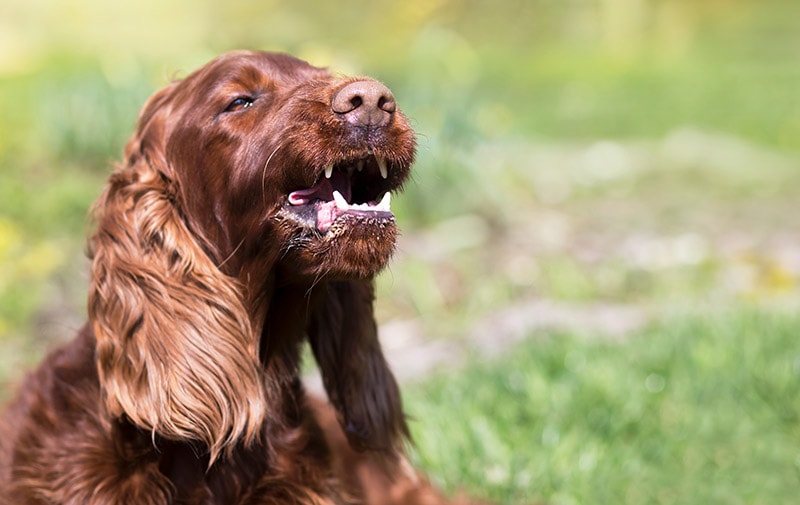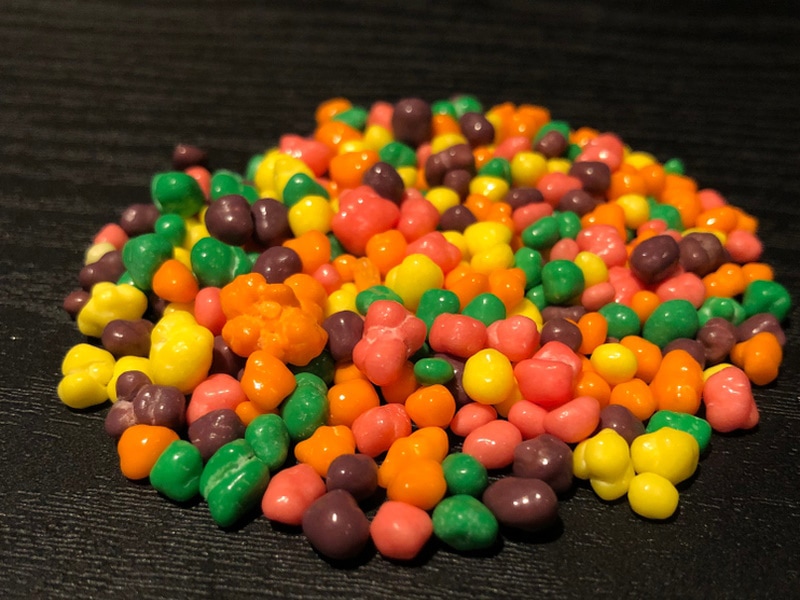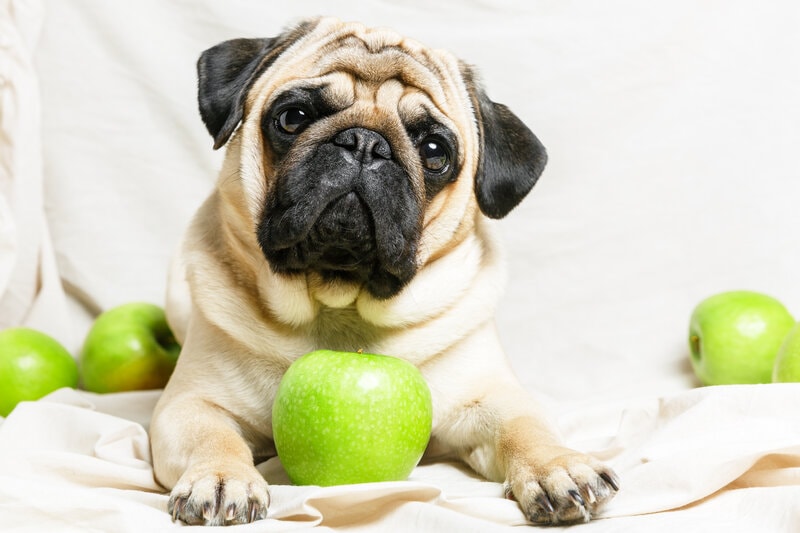Can Dogs Eat Cinnamon Rolls? Vet Verified Risks & Alternatives
By Ed Malaker
Updated on

Click to Skip Ahead
Dogs are known for their insatiable appetites and willingness to eat almost anything that comes their way. While some human foods are safe for dogs, others can pose serious health risks. One popular breakfast food that many pet owners may wonder about is cinnamon rolls. Unfortunately, these tasty treats can pose health risks to your pet, so you should not give any to your dog. Keep reading for a list of these risks and the alternatives that you can offer instead.
Risks of Feeding Cinnamon Rolls to a Dog
Sugar
Cinnamon rolls contain a large amount of sugar. While sugar isn’t toxic to dogs, too much can cause an upset stomach and excess calories over time will lead to weight gain and obesity. This is a major concern for pet owners, with experts suggesting that more than 50% of dogs in the United States are overweight. Therefore, it’s best to avoid anything that can contribute to this issue.
Artificial Sweeteners
You might think that giving a low-calorie cinnamon roll to your dog might help prevent the risk of obesity. However, many of these treats contain artificial sweeteners like xylitol, which is highly dangerous for dogs. Always carefully read the package of any food that you give your dog to ensure that it contains no toxic ingredients.

Fats
Cinnamon rolls contain saturated and trans fats. As well as contributing to weight gain, eating too much fatty food can lead to a painful condition called pancreatitis.
Cinnamon
While cinnamon isn’t inherently toxic to dogs, it can cause problems if your pet consumes it in large quantities. The Pet Poison Helpline reports that it would take ingestion of more than 1 teaspoon of cinnamon powder for it to cause problems for our dogs, such as skin and digestive tract irritation.
Dough
The raw dough used to make cinnamon rolls can be hazardous for dogs. When ingested, the dough can expand in the stomach, leading to bloating and potential gastric torsion, a severe condition that requires immediate veterinary attention. Therefore, you can never allow your pet to eat raw dough, let alone raw cinnamon rolls.
Other Ingredients
Commercial cinnamon rolls may contain other ingredients that can be toxic and harm your dog, like raisins, nutmeg, chocolate, and macadamia nuts.
Possible Benefits of Cinnamon for Dogs
Antioxidant Properties
Cinnamon contains antioxidants and anti-inflammatory compounds and may have some health benefits in dogs as it can do in people. In humans it is in many supplements designed for diabetics and other chronic health concerns. It may also help lower blood pressure.

Digestive Discomfort
Some people believe that eating a small amount of cinnamon can help relieve stomach discomfort in dogs but larger amounts can have the opposite effect.
Safer Alternatives
Plain Cinnamon
If you believe that your dog may enjoy the taste of cinnamon, sprinkle a small pinch of plain ground cinnamon over their regular dog food. Monitor their reaction to ensure that there are no adverse effects.
Carrot or Pumpkin Treats
Dogs often love carrots and pumpkins. These low-calorie treats provide some vitamins and fiber without many of the harmful ingredients in cinnamon rolls.

Commercial Dog Treats
Several commercial dog treats are healthy for your pet, speak to your vet for advice on the best ones for your dog.
Homemade Dog-Safe Cinnamon Roll Recipe
These homemade cinnamon rolls can be given to your dog as a special treat. Note that they will not be suitable for all dogs depending on factors such as underlying health conditions and if they are on a special diet. Always check with your vet first if you are unsure.
Ingredients
Dough
- 2 cups whole wheat flour
- 1/2 cup plain, unsweetened applesauce ( with no artificial sweeteners)
- 1/4 cup water
- 1 tbsp honey (optional)
- 1 tbsp ground cinnamon
Icing (optional)
- 1/4 cup plain, non-fat yogurt (with no artificial sweeteners)
Instructions
- Preheat your oven to 350 degrees, and line a baking sheet with parchment paper.
- Combine whole wheat flour, applesauce, water, and honey in a mixing bowl. Mix the ingredients thoroughly to form a dough. You can adjust the consistency by adding more water.
- Lightly flour your counter, and roll the dough into a rectangular shape, approximately ¼-inch thick.
- Sprinkle the ground cinnamon evenly over the rolled-out dough, creating a thin layer.
- Gently roll the dough from one end to the other, forming a log shape. You can use water to help seal the edges of the dough.
- Cut the dough log into small, bite-sized pieces using a sharp knife. Place the cinnamon rolls on the baking sheet, leaving space between them.
- Bake the cinnamon rolls in the oven for 15–20 minutes or until golden brown.
- Allow the cinnamon rolls to cool completely before serving one to your pet. You can add a small amount of plain yogurt as icing.
- Store any leftovers in an airtight container in the refrigerator. These homemade treats don’t contain preservatives, so they are only good for a few days.
Remember all treats should account for no more than 10% of your dog’s total daily calorie intake.
Frequently Asked Questions
What Should I Do If My Dog Accidentally Eats a Cinnamon Roll?
If your dog ate a cinnamon roll containing harmful substances, uncooked cinnamon rolls, or you are concerned, then you should contact your vet for guidance. Observe them closely for any signs of gastrointestinal distress such as tummy pain, vomiting or diarrhea.
How Can I Prevent My Dog From Eating Harmful Foods?
Store all human foods, especially those toxic to dogs, out of their reach. Training can also help teach them to avoid certain areas of the kitchen.
What Should I Do If My Dog Eats Something Toxic?
If you suspect that your dog has ingested something toxic, immediately contact your veterinarian or an emergency veterinary clinic. They can advise you on the best possible course of action.

Can Dogs Have Any Spices or Seasonings?
Dogs generally do not need spices or seasonings, and plain, unseasoned foods are usually best for their health. Mild herbs like basil or mint may be safe in small quantities, but it’s always best to consult your vet before adding new ingredients to your dog’s diet.
What Are Signs of Cinnamon Toxicity in Dogs?
Signs of cinnamon toxicity in dogs may include vomiting, diarrhea, excessive drooling, coughing, and difficulty breathing. If your dog has consumed a large amount of cinnamon, had access to cinnamon essential oil or inhaled cinnamon powder then seek immediate veterinary attention.
Can Dogs Eat Other Pastries or Desserts?
Unfortunately, most pastries and desserts designed for human consumption are high in sugar, unhealthy fats, and potentially harmful additives. Consuming them can lead to various health issues, so it’s best to avoid sharing pastries or desserts with your dog and stick to dog-friendly treats instead.
Summary
Unfortunately, your dog cannot enjoy your cinnamon rolls with you. Eating them can cause digestive upsets in the short term and weight gain and obesity if fed regularly. They may also contain ingredients that can be toxic to your canine companion. Instead offer your dog healthier treats such as carrots or commercial dog treats.
Although many dogs do not enjoy the strong aroma or taste of cinnamon, if your dog does then you can feed a tiny amount to them sprinkled on their food or as part of a dog-safe cinnamon roll recipe as a special treat. Call the vet if your pet has accidentally eaten a cinnamon roll which was uncooked, contained potentially harmful ingredients or if they are showing signs of being unwell after ingesting it.
See also:
Featured Image Credit: Pixabay, Pexels
















